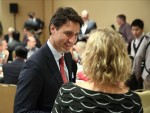Justin Trudeau schmoozes after a speech to the Richmond Chamber of Commerce in July. (photo from Justin Trudeau’s Office)
As Justin Trudeau’s Liberal party swept to a majority victory Monday night, it was British Columbia that finally made a difference. Without the 17 seats the Liberals took here, Trudeau would have won, but with a minority mandate – albeit a big one.
The Liberals swamped Vancouver and its suburbs, winning some seats that few, if any, observers anticipated they were even competitive in, particularly in the eastern suburbs. The North Shore was a Liberal sweep. In Vancouver South, the Conservatives lost their only foothold in the city as incumbent Wai Young lost to Liberal Harjit Sajjan.
Liberals Joyce Murray (Vancouver Quadra) and Hedy Fry (Vancouver Centre), the only two Liberals elected from British Columbia in 2011, trounced their respective opponents. Murray more than doubled the votes of her nearest competitor, a Conservative, and Fry almost tripled the vote of the second-place New Democrat.
The new riding of Vancouver Granville, slicing through the centre of the city north to south, is a microcosm of what appears to have happened locally and nationally. Several organizations had formed to encourage Canadians who opposed Harper’s Conservatives to vote strategically for the candidate most likely in their riding to defeat the Conservative. In Granville, Leadnow, probably the most prominent of the anti-Harper organizations, urged voters in the riding to back New Democrat Mira Oreck. This drew a backlash from Liberals, who said their candidate was either tied or ahead of the New Democrat in the available public opinion polls and the Vancouver Sun noted the friendship between Oreck and the head of Leadnow. In the end, so-called “change voters” seem to have looked at the national polling trends – which, by the end of the campaign, showed the Liberals slightly ahead of the Conservatives and NDP support dissipating – and turned red. In the end, Liberal Jody Wilson-Raybould took nearly 44% of the vote, with Oreck and Tory candidate Erinn Broshko effectively tied at 26%, Oreck edging out the Tory by 38 votes for second place; Green candidate Michael Barkusky took about three percent. Oreck and Barkusky are members of the Jewish community.
There were no clearly evident trends in ridings across the country with concentrations of Jewish voters. In the Montreal riding of Mount Royal, held until the election by retiring Liberal Irwin Cotler, Anthony Housefather, the Liberal candidate and mayor of the suburb of Cote-Saint-Luc, beat Conservative Robert Libman by a comfortable margin. Both Housefather and Libman are Jewish.
In Thornhill, the Toronto-area riding with the country’s largest concentration of Jewish voters, Conservative incumbent Peter Kent trounced Liberal Nancy Coldham. In Eglinton-Lawrence, incumbent Conservative finance minister Joe Oliver, the most senior Jewish official in Ottawa, lost by a significant margin to Liberal Marco Mendicino. In York Centre, another Toronto riding with large numbers of Jewish voters, Tory Mark Adler was narrowly defeated by Liberal Michael Levitt. Adler is known nationally mostly for his foibles, such as calling out to advisers of Prime Minister Stephen Harper at the Western Wall in Jerusalem to be included in a photo opportunity and, several weeks ago, for seeming to exploit his family’s history in the Holocaust for political gain.
In 2011, post-election surveys indicated that Jewish voters supported the Conservative party by large margins. Though such indicators are not yet available for this week’s election, it appears that Jewish voters are far from being a monolithic bloc.

